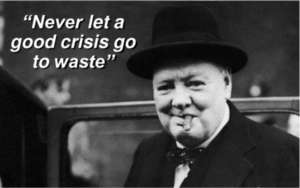3 Key Focus Areas to Propel Your Business Success in 2025 and Beyond
By: Marc Blais, TEC Chair
Many SMEs have been impacted by the economic slowdown in recent months. Some businesses have adjusted quickly—their constant diligence and extreme attention to KPIs allowed them to correct course.
However, I notice that the majority of businesses resisted adapting, hoping the situation would improve in a few months…
In an entrepreneur’s life, favorable changes rarely happen without effort.
I prefer to choose the scenario that pushes me to improve rather than wait for the context to become favorable again. If I am too pessimistic (I have an accounting background) about the return to normalcy in the economy, I will regain profitability and have financial resources available to deploy my growth strategies. Moreover, I will have protected the morale of my teams.
Here are 3 key focus areas to help you drive business success in 2025 and beyond…
1. Break Isolation
What happens within your company is simultaneously happening to your peer entrepreneurs. In a TEC Canada peer group, it is quite rare for only one member of the group to be concerned about an issue presented to the group. In fact, it has never happened to me and my members feel the same way.
When I ask members what they gain from their TEC group, it’s often their response, as evidenced by Martin McNicoll, former president of Solution Guru and now CEO of La Distillerie des Cantons de l’Est. (Link to his video here: YouTube)
I also recommend the excellent book by Leo Bottary. Leo is an official TEC Canada speaker. To get to know him better, I invite you to watch this webinar: TEC Canada Webinar
2. Face Reality
We all need to know where we are going. We need a plan to move forward and structure ourselves. We are tempted to predict the future because it’s part of the plan. The problem is that no one can predict the future.
So, why try, and what is the solution? Which reality should we consider for our strategic choices?
Here’s my solution:
Ask your financial controller or CFO to prepare 3 scenarios for the next year:
- Scenario A: Based on continuity from the previous year
- Scenario B: More pessimistic than what you hope for (considering a potential drop in sales and a potential loss of market share or some clients)
- Scenario C: More optimistic than what you hope for (considering new products and new clients)
These financial forecasts will bring you back to reality. Is the pessimistic version really that catastrophic? How could you better prepare for it? What does the optimistic version imply in terms of investments? What are your financing needs? What are your recruitment needs?
Planning the next year without enlightening forecasts would be like pushing a team to move forward in the dark without flashlights. An entrepreneur is a high-level athlete, they must be able to perform in all scenarios.
“High-level sports do not have the exclusivity of resistance to change. If you experience similar situations in business, some advice:
The perspective on a new context matters much more than the context itself. It is crucial for what follows: we better appropriate and exploit an evolution that we accept and seek the good sides of.
You will always find more pleasure and motivation in embracing change than in opposing it by all means.”
– Edgar Grospiron
And what if you simply aimed higher? What do I mean?

“Never let a good crisis go to waste!”
- Winston Churchill
Your ultimate goal, that is, your Infinite Game (Simon Sinek), is not limited to the next year.
I suggest you take the opportunity to project yourself over 10 years. From experience, thinking as far ahead as 10 years is an excellent way to create a strategic innovation reflection that will motivate your teams.
3. Develop Your Mindset with Your Coach
For business success in 2025 and beyond, focus on developing a winning mindset and ensure your direct reports follow suit. Ask yourself what is preventing you from being optimistic about business success. Change that perception with the help of an executive coach.
Here are some elements you could work on with your executive coach:
- Experiencing the right type of stress: Burnout is not caused by too much stress, it is caused by the wrong type of stress.
- The illusion of urgency: When every deadline is communicated as urgent, it trains the brain to stay in a constant state of fight or flight, even when the actual threat level is low.
- Resilience can be harmful: Praising your team members for persevering despite exhaustion ignores an important reality; true resilience is built through cycles of effort AND recovery, not through endless pressure.
- Manageable challenge is when it’s difficult but with clear objectives, adequate resources, and a sense of control. This situation strengthens efficiency and confidence.
- Toxic chaos is when you are overwhelmed by contradictory demands, lack of support, and the feeling that hard work won’t be recognized anyway. This situation leads to burnout.
The leader’s role is to shape the type of stress your team experiences by:
- Protecting your team from unnecessary chaos (contradictory customer demands, unnecessary administration) while leaving them with the daily challenges of their task.
- Focusing their energy on factors they can influence and not on what is beyond their control.
- Celebrating micro-victories: Recognizing small progress helps the brain recharge, focusing only on the distant finish line is exhausting.
- Taking time for reflection and less stressful work after intense periods.
Mental health is a condition for sustainable performance.
Think about this: What type of stress are you unconsciously fostering in your team (even with your best intentions)?
For more information about TEC Canada, you can reach out directly to me in the links below, or by filling out the form below.

Become A Member
"*" indicates required fields




